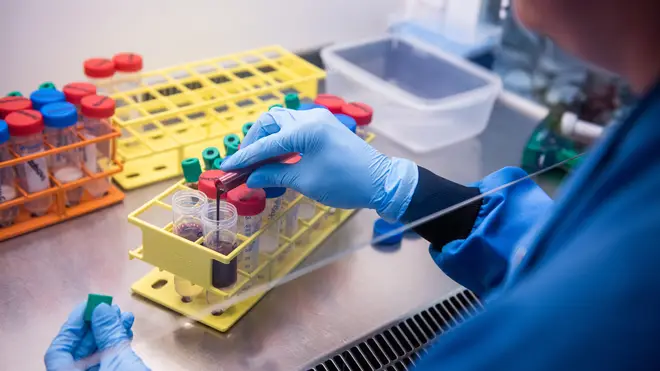
Lewis Goodall 10am - 12pm
30 December 2020, 11:45 | Updated: 30 December 2020, 12:16

Government regulators have announced a major change to the vaccine rollout strategy, meaning more people will be given a first dose to achieve mass protection.
There are now two vaccines which have been approved for use in the UK - a Pfizer vaccine which began being administered three weeks ago, and an Oxford vaccine which was approved for use today.
Both vaccines need two doses to work, and in order to ensure a high level of uptake, there is "immediate urgency" for as many people as possible to receive the first dose as quickly as possible.
Speaking at a briefing at Downing Street today, Professor Wei Shen Lim, chair of the Joint Committee of Vaccinations and Immunisations, said: "We recommend delivery of the first vaccine should be prioritised for both the Pfizer/BioNTech and the Oxford-AstraZeneca vaccine."
Read more: Matt Hancock - 'We will be out of this by spring' after Oxford Covid vaccine approval
Experts have determined the first dose of the Oxford vaccine is 70% effective 22 days after the first dose, and recommends the interval between the first and second should be between four and 12 weeks.
The initial plan for those having the Pfizer jab was to have the second dose 21 days after the first, but now guidance says the secondary injection can be given up to 12 weeks after the first.

'We will be out of this by Spring,' Matt Hancock tells LBC
A joint statement from the four UK Chief Medical Officers said: "The MHRA authorisation includes conditions that the AstraZeneca (Oxford) vaccine should be administered in two doses, with the second dose given between 4 and 12 weeks after the first.
"The MHRA has also clarified that for the Pfizer/BioNTech vaccine, the interval between doses must be at least 3 weeks. For both vaccines, data provided to MHRA demonstrate that whilst efficacy is optimised when a second dose is administered both offer considerable protection after a single dose, at least in the short term.
"For both vaccines the second dose completes the course and is likely to be important for longer term protection. The JCVI has subsequently recommended that as many people on the JCVI priority list as possible should sequentially be offered a first vaccine dose as the initial priority."
The UK has ordered 100 million doses of the Oxford University vaccine, enough to vaccinate 50 million people.

Mr Hancock said the plan is to vaccinate all vulnerable groups first, but all adults, including the under-50s, will eventually be offered a jab.
England's chief medical officer, Professor Chris Whitty, said the jab is "safe and effective", while Dr June Raine, chief executive of the MHRA, said her team of scientists and clinicians had "very carefully and methodically and rigorously reviewed all the data on safety, on effectiveness, and on quality".
She added: "No corners, whatsoever, have been cut.
"The safety of the public always comes first."
More to follow...